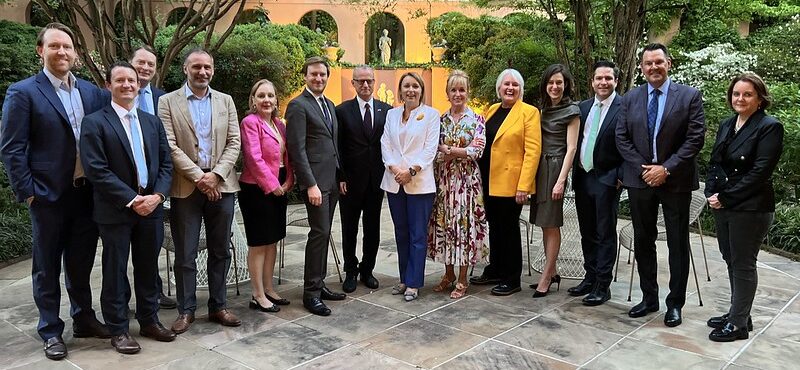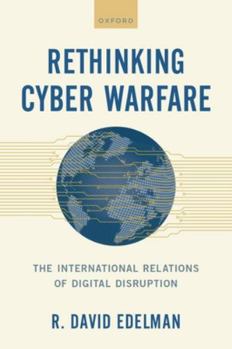
The seventh installment of the Institute for Education’s (IFE) Future of AI Dinner focused in particular on the challenges and opportunities posed by China’s advances in the space, brought together senior Administration officials and Capitol Hill leadership, executives from industry, journalists, and academic experts at the elegant home of the EU Ambassador to the United States and IFE Diplomatic Steward of AI, Jovita Neliupšienė. The evening began in the Residence’s Italianate courtyard in full bloom, and after a welcome reception and toast to the upcoming release of Dr. Edelman’s new book Rethinking Cyber Warfare, transitioned to a lively and thought-provoking dinner discussion.
The conversation touched on a wide range of topics, including the challenges of measuring AI progress, especially in the context of China’s advancements — and whether either side could objectively measure their progress in AI, absent broadly agreed standards. There was a general understanding that both the United States and China ran the risk of over-estimating the other’s capabilities in and confidence with AI, leading to the potential for instability. Exacerbating the problem, participants noted, was the media’s tendency to “sportsify” AI coverage, focusing more on the competition between nations rather than the broader implications. Concern was also expressed about how preemptive regulations, particularly absent complementary programming to enhance the workforce’s AI capabilities and incentivize responsible innovation, might hinder a country or region’s ability to compete in the AI race. Despite these challenges, attendees acknowledged the breakthroughs — albeit tentative — in AI being placed on the bilateral agenda for President Biden and President Xi, carrying forward six years of work by academics and think tanks to lay the foundation for dialogue that aims to prevent unnecessary conflicts
Numerous participants noted the depth of the relationship between the United States, EU, and other close friends and allies in the development of a common AI policy agenda, emphasizing that this agenda was simultaneously being developed internationally and at home. With these engagements in mind, the discussion also highlighted the need for a common vocabulary to facilitate meaningful conversations about AI among international friends and competitors alike, drawing parallels to the lessons learned during the Cold War era. Participants expressed a strong desire to avoid the slow and imperfect transition process experienced in the IT world with cybersecurity, which continues to pose significant vulnerabilities. The conversation also touched on the potential threats posed by deepfakes, particularly in the context of upcoming elections, and the importance of democracies developing robust defenses against such threats — but questioned whether an overemphasis on this particular vector might leave some governments blind to new, creative, and perhaps even more pernicious threats to democracy.
Guests extended a special thanks to chef David G. Martins for the exceptional, EU-inspired cuisine. Before adjourning, guests received the first in-print copies of Rethinking Cyber Warfare: The International Relations of Digital Disruption, by IFE President and #1 best-selling author Dr. R. David Edelman, who signed copies for attendees.
SPOTTED: IFE Diplomatic Steward of AI H.E. Jovita Neliupšienė Ambassador, EU Delegation to the US; Dr. R. David Edelman, IPRI Distinguished Fellow, MIT and IFE President; Coach Kathy Kemper, IFE Founder & CEO; Robert D. Williams, Director for China, National Security Council, The White House; Clare Martorana, Federal Chief Information Officer at OMB, Executive Office of the President United States; Elizabeth Kelly, Director, A.I. Safety Institute, NIST; H.E. Marek Magierowski, Ambassador of Poland; Ryan Hass, Director, John Thornton China Center, Brookings; Dan Mercia, Investigative Reporter, Associated Press; Gerry Petrella, General Manager for U.S. Public Policy, Microsoft; Gail Slater, Economic Policy Advisor, Office of Senator J.D. Vance, and Mike Sullivan, President Global Field Operations, Phosphorus Cybersecurity. Joining from the EU Delegation were Michelle DeMoor, China trade expert, and Michelangelo Margherita, Head of Trade and Agriculture.

“Rethinking Cyber Warfare: The International Relations of Digital Disruption” is a book by R. David Edelman, which provides a comprehensive look at the role digital disruption plays in contemporary international security. The book focuses on major cyberattacks against wired societies and explores the forces in the international system that might restrain their use. It delves into how deterrence, international law, and normative taboos shape states’ decisions regarding cyber warfare. The book is now available for purchase, and with details at RethinkingCyberWarfare.com.